Reservation Of Rights Letter Example
[Your Name]
[Your Address]
[City, State, Zip Code]
[Email Address]
[Phone Number]
[Date]
[Insurance Company Name]
[Claims Department]
[Address]
[City, State, Zip Code]
Re: Policy Number: [Policy Number]
Claim Number: [Claim Number]
Dear Claims Department,
I am writing to inform you that I recently became aware of a potential claim under the above-mentioned policy. However, I must respectfully reserve all of my rights with regard to coverage and any other related matters concerning this claim.
As of the date of this letter, I am not waiving any rights, coverages, or defenses that I may have under the insurance policy. I also want to clarify that my reservation of rights should not be interpreted as an acknowledgment of liability or a commitment to provide coverage.
At this time, the specific details of the claim are still being investigated and reviewed, and the circumstances surrounding the incident are subject to further examination. Until a full investigation is completed and all relevant information is gathered, I cannot conclusively determine whether this claim falls within the scope of the policy coverage.
I kindly request that your investigation into this matter be thorough, transparent, and conducted in a timely manner. As the policyholder, I expect to be kept informed of any developments regarding this claim, including updates on the investigation and the decision regarding coverage.
Please consider this letter as a formal reservation of my rights under the policy. I expect that any communications, negotiations, or settlements related to this claim will be conducted with this reservation in mind.
In the event that coverage is ultimately denied or limited for any reason, I will rely on this reservation of rights letter to protect my interests and seek all available remedies under the policy and applicable law.
Should you require any additional information or documentation from me to assist in your investigation, please do not hesitate to contact me at the phone number or email address provided above.
Thank you for your attention to this matter. I look forward to your prompt response and a fair resolution.
Sincerely,
[Your Name]
Reservation of Rights Letter – Professional Tone
Subject: Reservation of Rights
Dear [Recipient Name],
We are writing to formally notify you that, while we are currently reviewing the circumstances surrounding [specific issue], we expressly reserve all rights, claims, and defenses available to us under applicable law. This reservation of rights is made without waiver of any rights, remedies, or positions, whether presently known or unknown, that we may have in connection with this matter.
Please consider this letter as our official notice that our position is protected while we continue to investigate and consider our next steps.
Sincerely,
[Your Name]
[Your Title / Organization]
Reservation of Rights Email – Casual Tone
Subject: Quick Note – Reserving Our Rights
Hi [Recipient Name],
Just wanted to let you know that while we look into [issue], we’re reserving all our rights here. This doesn’t mean we’re taking any action right now, but we want to make sure nothing is lost as we figure things out.
Thanks for understanding,
[Your Name]
Reservation of Rights Letter – Formal Legal Context
Subject: Formal Reservation of Rights
Dear [Recipient Name],
This letter serves as a formal notice that [Your Company / Your Name] expressly reserves all rights, claims, and defenses regarding [specific dispute or contract]. This reservation is without prejudice and shall not constitute a waiver of any rights, remedies, or defenses that may be available now or in the future under applicable laws or agreements.
Kindly acknowledge receipt of this correspondence.
Respectfully,
[Your Name]
[Your Title / Organization]
Reservation of Rights Letter – Insurance Claim Scenario
Subject: Reservation of Rights – Claim #[Claim Number]
Dear [Recipient Name],
We acknowledge receipt of your recent claim submission. Please note that, while we are reviewing the claim, we explicitly reserve all rights under the policy. Our review should not be interpreted as a waiver or acceptance of any potential defenses or limitations contained in the policy.
We will continue our investigation and inform you of our findings in due course.
Sincerely,
[Insurance Adjuster Name]
[Insurance Company]
Reservation of Rights Letter – Contract Dispute
Subject: Reservation of Rights Concerning Contract [Contract Number]
Dear [Recipient Name],
We write regarding the ongoing discussions and disputes related to [contract description]. By sending this letter, we expressly reserve all rights and defenses under the contract and applicable law. Nothing herein should be interpreted as a waiver of any rights or obligations.
We remain committed to resolving this matter amicably, while ensuring our legal rights are fully protected.
Best regards,
[Your Name]
[Your Position / Company]
Reservation of Rights Letter – Creative Informal Scenario
Subject: Heads Up – Reserving Rights
Hey [Recipient Name],
Just a quick heads-up: while we sort out [the issue], we’re reserving our rights. This isn’t a formal action yet, but we wanted to make sure there’s no misunderstanding if things get complicated later.
Cheers,
[Your Name]
What / Why a Reservation of Rights Letter is Needed
- A reservation of rights letter formally notifies the recipient that the sender maintains certain legal or contractual rights while considering further actions.
- It serves as protection against waiving rights unintentionally.
- Typically used in disputes, claims, insurance matters, and contractual issues.
Who Should Send a Reservation of Rights Letter
- Legal representatives or counsel on behalf of a client.
- Organizations or companies managing disputes, claims, or contracts.
- Individuals directly involved in a matter who wish to maintain their rights.
Whom Should Receive the Letter
- Opposing parties in a dispute.
- Insurance companies or adjusters handling claims.
- Contractual partners or entities involved in negotiation or disagreement.
When to Send a Reservation of Rights Letter
- Upon receiving a claim or notice of dispute.
- During contract disagreements or negotiations.
- When responding to potential liability situations, such as accidents or breaches.
- While investigating a situation without waiving rights.
How to Write and Send a Reservation of Rights Letter
- Identify the issue or claim clearly.
- State explicitly that you are reserving all rights, claims, and defenses.
- Maintain a professional and neutral tone.
- Decide the mode of delivery (email for quick notice, printed letter for formal/legal purposes).
- Keep a copy for records.
Requirements and Prerequisites Before Sending
- Full understanding of the legal or contractual context.
- Documentation of the issue or claim being addressed.
- Clarity on which rights, claims, or defenses are being reserved.
- Approval from legal counsel if needed.
Formatting Guidelines for Reservation of Rights Letters
- Length: Concise, usually one page or less.
- Tone: Formal, professional, or neutral depending on context.
- Wording: Clear, unambiguous, and assertive without being confrontational.
- Style: Structured with subject, greeting, body, closing, and signature.
- Mode: Email or printed letter, depending on urgency and formality.
Elements and Structure of the Letter
- Subject line clearly indicating purpose.
- Salutation addressing the recipient.
- Body: Explanation of the context and explicit reservation of rights.
- Closing: Professional sign-off.
- Optional attachments: Supporting documentation or reference to prior communications.
After Sending / Follow-up Steps
- Keep a copy of the letter for records.
- Track any acknowledgment or responses from the recipient.
- Prepare next steps based on the recipient's reaction or legal developments.
- Consult legal counsel if the matter escalates.
Tricks and Tips for Effective Reservation of Rights Letters
- Be concise but precise; avoid vague language.
- Always state that the reservation is "without prejudice" or "without waiver."
- Use professional formatting to ensure credibility.
- Decide the tone based on the relationship with the recipient.
- Include references to contracts, claims, or policy numbers if relevant.
Common Mistakes to Avoid
- Failing to explicitly reserve rights, which can result in unintentional waivers.
- Being overly aggressive or confrontational.
- Omitting crucial context or references to agreements.
- Sending without keeping a copy for records.
- Mixing casual tone in highly formal legal matters.
FAQ About Reservation of Rights Letters
-
Q: Does sending this letter mean I am taking legal action?
A: No, it only preserves your rights while assessing next steps. -
Q: Can a reservation of rights letter be emailed?
A: Yes, emails are acceptable if they are clear and formally worded. -
Q: Is it necessary to involve a lawyer?
A: Legal counsel is recommended, especially in complex disputes. -
Q: What if the recipient ignores the letter?
A: Keep records and consult legal counsel; your rights remain reserved.
Compare and Contrast With Other Letters
- Unlike demand letters, a reservation of rights letter does not request action or payment.
- Unlike apology letters, it does not admit fault; it only preserves rights.
- Similar to preliminary legal notices, but focused solely on maintaining legal positions.

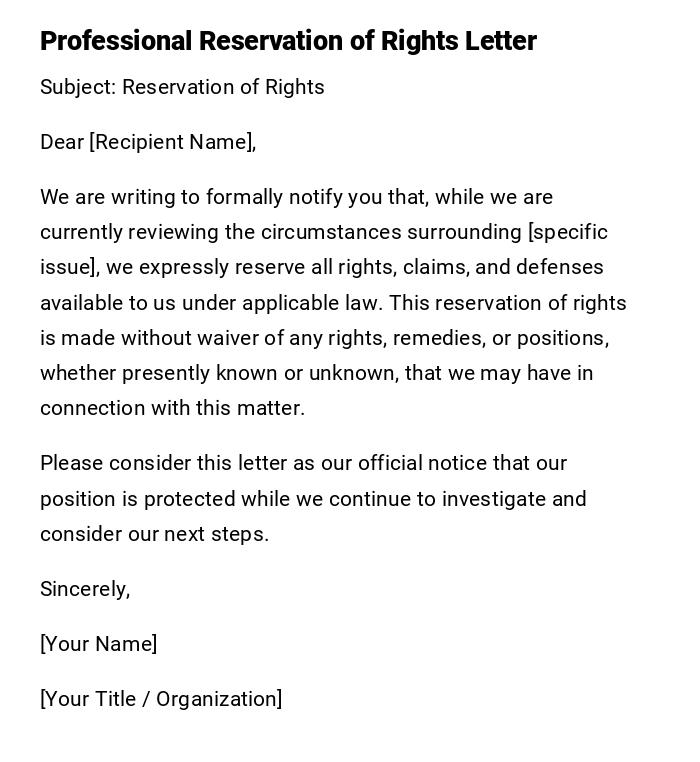
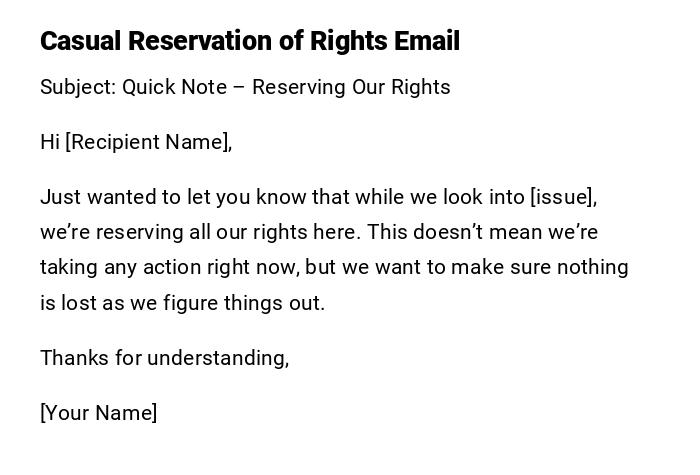
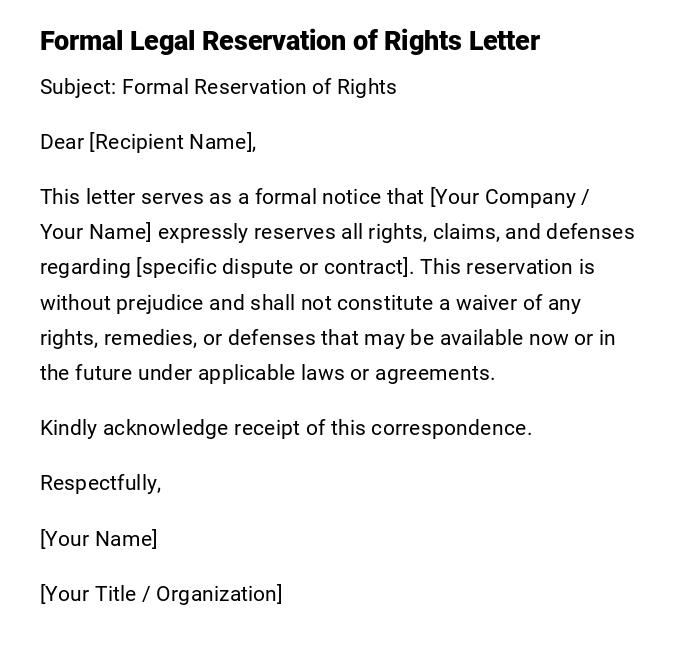
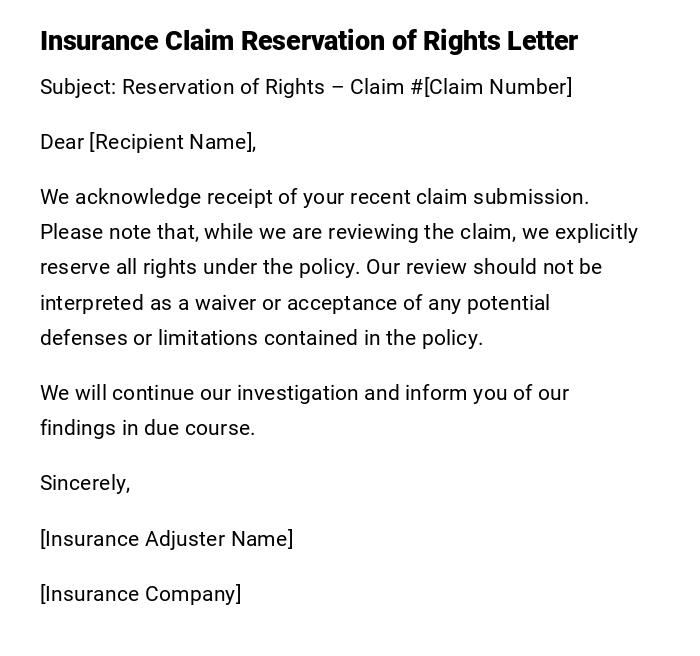
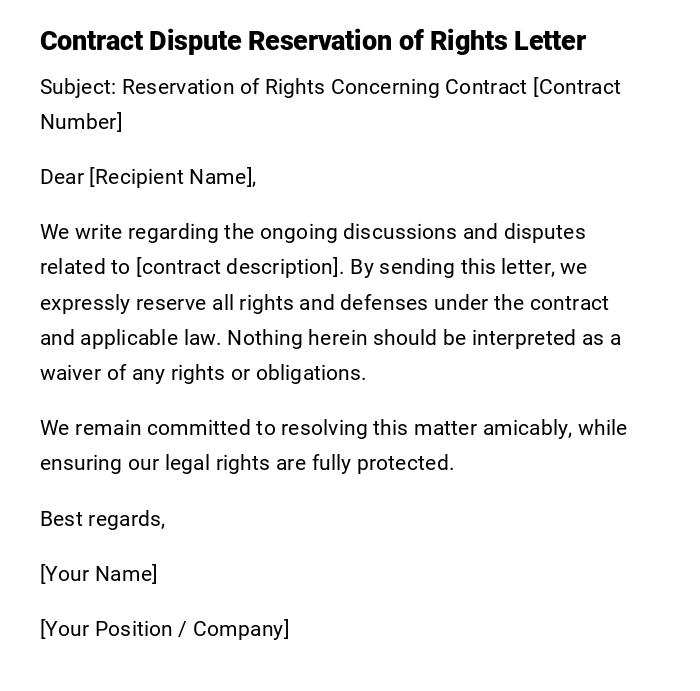
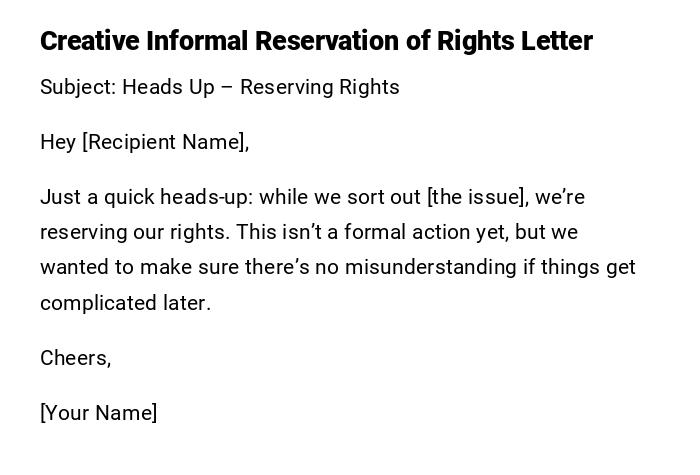

 Download Word Doc
Download Word Doc
 Download PDF
Download PDF